Burt A. The Evolution of the British Empire and Commonwealth From the American Revolution
Подождите немного. Документ загружается.

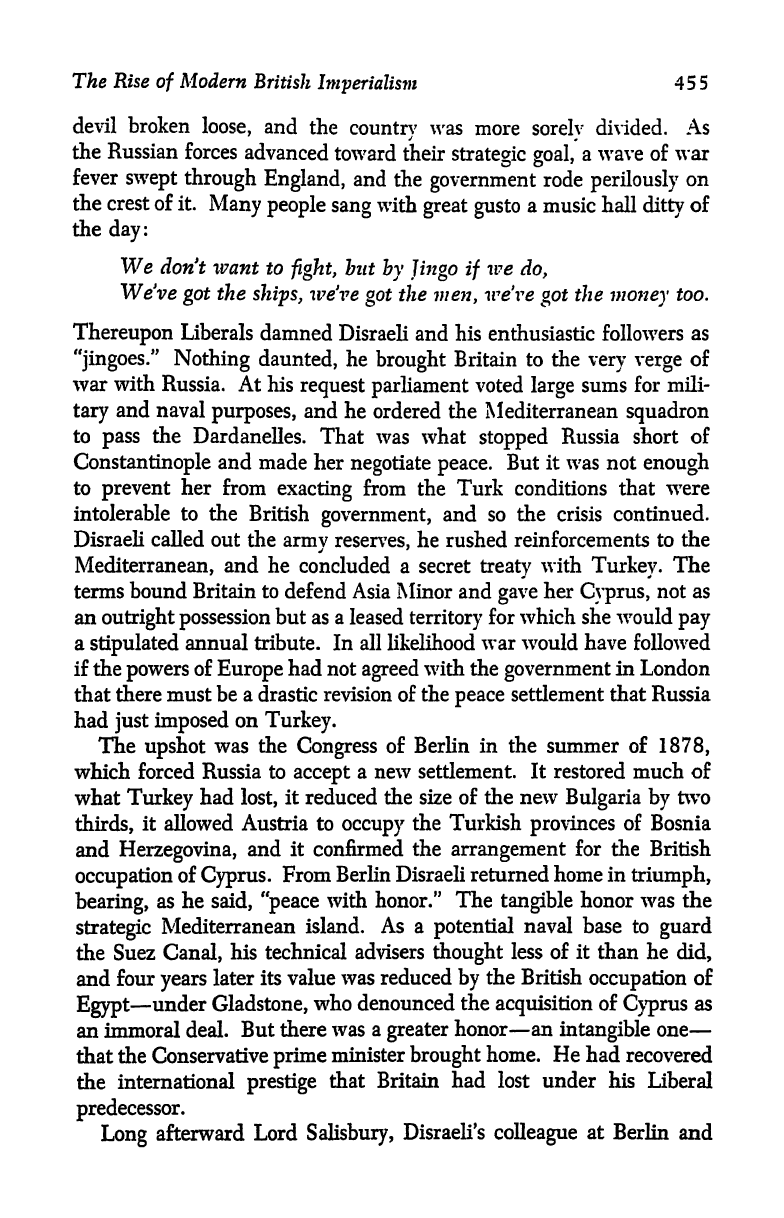
The
Rise
of
Modern
British
Imperialism
455
devil
broken
loose,
and
the
country
was
more
sorely
divided.
As
the
Russian
forces
advanced
toward
their
strategic goal,
a
wave
of
war
fever
swept
through
England,
and
the
government
rode
perilously
on
the
crest of
it.
Many
people
sang
with
great
gusto
a
music
hall
ditty
of
the
day:
We
don't
want
to
fight,
but
by
Jingo
if
we
do,
We've
got
the
ships,
we've
got
the
men,
we've
got
the
money
too.
Thereupon
Liberals
damned
Disraeli
and his
enthusiastic followers
as
"jingoes."
Nothing
daunted,
he
brought
Britain
to the
very
verge
of
war
with
Russia. At
his
request parliament
voted
large
sums for
mili-
tary
and
naval
purposes,
and
he ordered the Mediterranean
squadron
to
pass
the
Dardanelles. That
was
what
stopped
Russia short
of
Constantinople
and made her
negotiate
peace.
But it was not
enough
to
prevent
her
from
exacting
from the
Turk conditions that
were
intolerable
to the
British
government,
and
so
the
crisis
continued.
Disraeli
called
out
the
army
reserves,
he rushed
reinforcements
to
the
Mediterranean,
and he
concluded a
secret
treaty
with
Turkey.
The
terms
bound
Britain to
defend
Asia Minor and
gave
her
Cyprus,
not
as
an
outright possession
but as
a
leased
territory
for which she would
pay
a
stipulated
annual tribute.
In
all
likelihood
war would
have
followed
if the
powers
of
Europe
had not
agreed
with the
government
in
London
that
there must be
a
drastic
revision
of
the
peace
settlement that Russia
had
just imposed
on
Turkey.
The
upshot
was
the
Congress
of
Berlin in
the
summer of
1878,
which
forced Russia to
accept
a new settlement. It
restored
much
of
what
Turkey
had
lost,
it
reduced
the size of
the new
Bulgaria
by
two
thirds,
it allowed
Austria
to
occupy
the Turkish
provinces
of
Bosnia
and
Herzegovina,
and
it
confirmed
the
arrangement
for the British
occupation
of
Cyprus.
From
Berlin
Disraeli
returned
home in
triumph,
bearing,
as
he
said,
"peace
with honor." The
tangible
honor was
the
strategic
Mediterranean
island.
As a
potential
naval base
to
guard
the Suez
Canal,
his
technical advisers
thought
less of
it
than he
did,
and
four
years
later
its
value was
reduced
by
the British
occupation
of
Egypt
under
Gladstone,
who denounced
the
acquisition
of
Cyprus
as
an
immoral
deal.
But there
was
a
greater
honor an
intangible
one
that
the Conservative
prime
minister
brought
home.
He had
recovered
the
international
prestige
that Britain
had
lost
under
his
Liberal
predecessor.
Long
afterward
Lord
Salisbury,
Disraeli's
colleague
at
Berlin
and
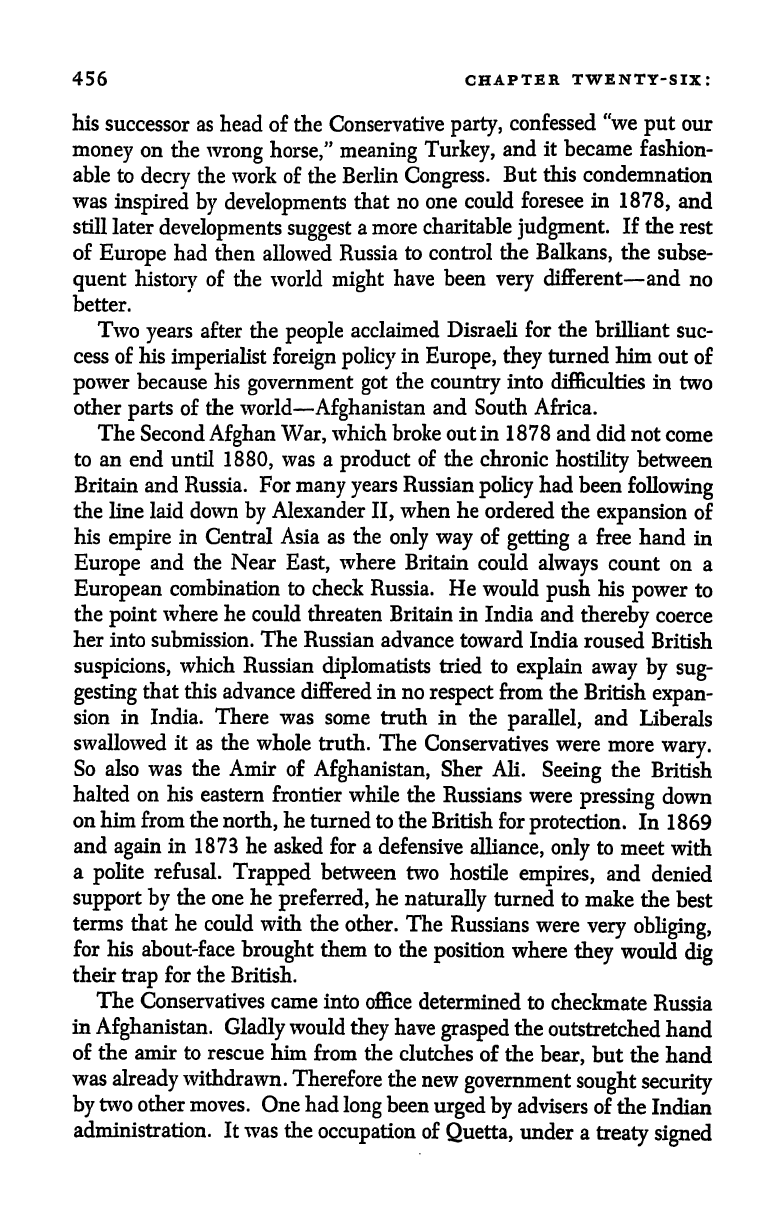
456
CHAPTER TWENTY-SIX:
his
successor as
head of the Conservative
party,
confessed
"we
put
our
money
on
the
wrong
horse,"
meaning
Turkey,
and
it became
fashion-
able
to
decry
the
work of the
Berlin
Congress.
But this
condemnation
was
inspired by
developments
that
no
one
could
foresee
in
1878,
and
still later
developments
suggest
a
more
charitable
judgment.
If
the
rest
of
Europe
had then
allowed
Russia
to control
the
Balkans,
the
subse-
quent
history
of
the
world
might
have
been
very
different
and
no
better.
Two
years
after
the
people
acclaimed
Disraeli for
the
brilliant
suc-
cess
of his
imperialist foreign
policy
in
Europe, they
turned
him
out
of
power
because his
government
got
the
country
into
difficulties
in
two
other
parts
of
the world
Afghanistan
and South Africa.
The
Second
Afghan
War,
which broke out in 1878
and
did not
come
to an
end
until
1880,
was
a
product
of the
chronic
hostility
between
Britain
and
Russia. For
many years
Russian
policy
had been
following
the line laid down
by
Alexander
II,
when he
ordered the
expansion
of
his
empire
in Central
Asia
as
the
only
way
of
getting
a
free
hand
in
Europe
and the
Near
East,
where
Britain
could
always
count on
a
European
combination
to
check Russia. He
would
push
his
power
to
the
point
where
he
could threaten Britain in
India
and
thereby
coerce
her into
submission.
The Russian
advance
toward India
roused
British
suspicions,
which Russian
diplomatists
tried to
explain
away by
sug-
gesting
that this
advance
differed
in
no
respect
from
the
British
expan-
sion
in
India.
There
was
some truth
in the
parallel,
and
Liberals
swallowed
it
as the
whole truth. The
Conservatives were
more
wary.
So also was the Amir
of
Afghanistan,
Sher
Ali.
Seeing
the
British
halted
on his
eastern
frontier while the
Russians were
pressing
down
on
him from
the
north,
he
turned
to
the
British
for
protection.
In
1869
and
again
in 1873
he
asked for a
defensive
alliance,
only
to
meet
with
a
polite
refusal.
Trapped
between
two
hostile
empires,
and
denied
support by
the one
he
preferred,
he
naturally
turned to
make
the
best
terms
that
he
could
with
the other.
The
Russians
were
very
obliging,
for
his about-face
brought
them
to the
position
where
they
would
dig
their
trap
for the
British.
The
Conservatives came into
office
determined to
checkmate
Russia
in
Afghanistan. Gladly
would
they
have
grasped
the
outstretched
hand
of
the amir
to rescue
him
from the
clutches
of
the
bear,
but
the
hand
was
already
withdrawn.
Therefore
the
new
government
sought
security
by
two other moves.
One had
long
been
urged by
advisers
of
the
Indian
administration.
It was
the
occupation
of
Quetta,
under
a
treaty
signed
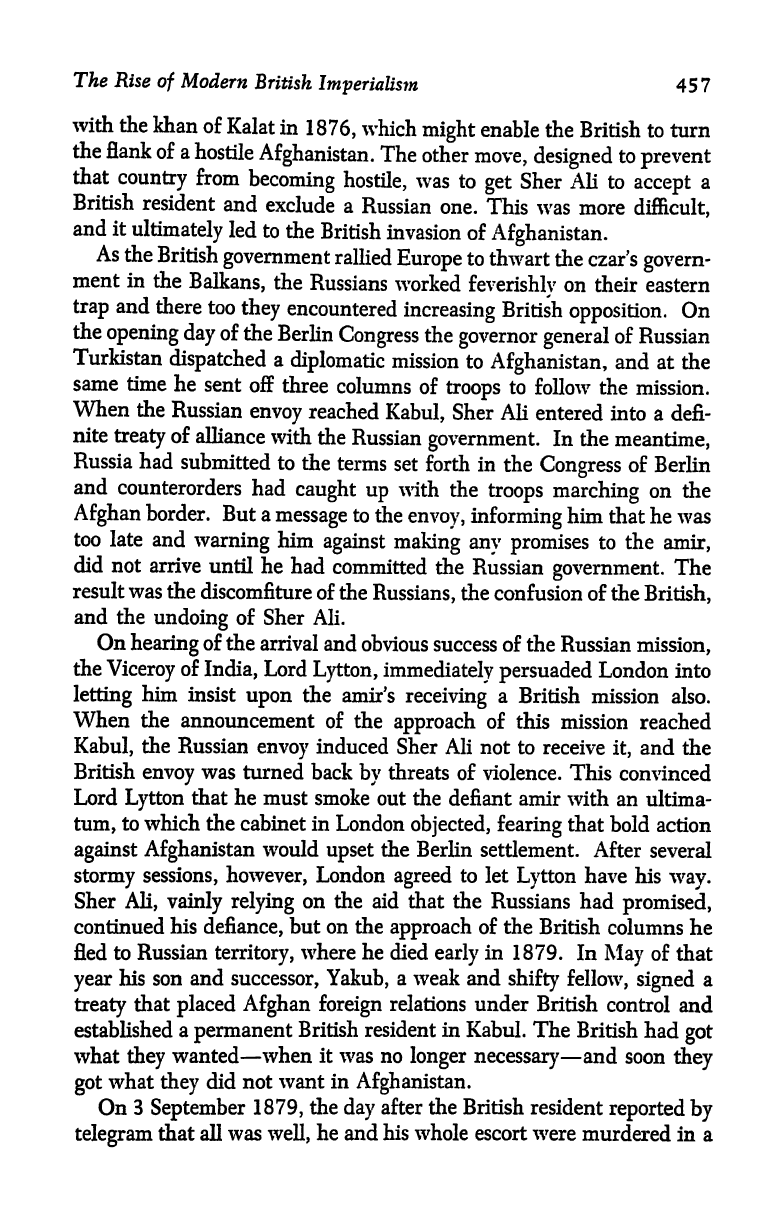
The
Rise
of
Modern
British
Imperialism
457
with
the
khan
of
Kalat
in
1876,
which
might
enable the
British to
turn
the
flank
of a
hostile
Afghanistan.
The other
move,
designed
to
prevent
that
country
from
becoming
hostile,
was
to
get
Sher
Ali to
accept
a
British
resident
and
exclude a
Russian
one.
This was
more
difficult,
and it
ultimately
led
to
the
British
invasion
of
Afghanistan.
As
the
British
government
rallied
Europe
to thwart
the czar s
govern-
ment in
the
Balkans,
the
Russians
worked
feverishly
on their
eastern
trap
and
there
too
they
encountered
increasing
British
opposition.
On
the
opening day
of
the
Berlin
Congress
the
governor
general
of Russian
Turkistan
dispatched
a
diplomatic
mission
to
Afghanistan,
and
at
the
same time
he
sent
off
three
columns
of
troops
to
follow the
mission.
When
the
Russian
envoy
reached
Kabul,
Sher
Ali
entered into a
defi-
nite
treaty
of
alliance
with
the
Russian
government.
In the
meantime,
Russia
had
submitted
to
the
terms
set
forth in
the
Congress
of
Berlin
and
counterorders
had
caught up
with the
troops
marching
on the
Afghan
border.
But a
message
to the
envoy,
informing
him
that he was
too
late
and
warning
him
against
making any
promises
to the
amir,
did
not arrive
until
he
had
committed the
Russian
government.
The
result
was
the
discomfiture
of
the
Russians,
the
confusion of the
British,
and
the
undoing
of Sher
Ali.
On
hearing
of
the
arrival
and
obvious
success of the
Russian
mission,
the
Viceroy
of
India,
Lord
Lytton,
immediately persuaded
London into
letting
him
insist
upon
the
amir's
receiving
a
British mission
also.
When the
announcement
of the
approach
of
this mission
reached
Kabul,
the Russian
envoy
induced Sher Ali
not to
receive
it,
and
the
British
envoy
was turned
back
by
threats
of violence.
This
convinced
Lord
Lytton
that he
must smoke out
the
defiant amir
with an
ultima-
tum,
to which the cabinet
in
London
objected,
fearing
that bold
action
against
Afghanistan
would
upset
the
Berlin settlement.
After
several
stormy
sessions,
however,
London
agreed
to let
Lytton
have
his
way.
Sher
Ali,
vainly
relying
on the
aid that the
Russians
had
promised,
continued his
defiance,
but on the
approach
of the
British
columns he
fled to
Russian
territory,
where he
died
early
in
1879.
In
May
of that
year
his son
and
successor, Yakub,
a
weak
and
shifty
fellow,
signed
a
treaty
that
placed Afghan
foreign
relations under
British
control
and
established
a
permanent
British
resident in
Kabul. The
British
had
got
what
they
wanted
when it was no
longer necessary
and
soon
they
got
what
they
did
not
want
in
Afghanistan.
On
3
September
1879,
the
day
after the British
resident
reported
by
telegram
that
all
was
well,
he and his
whole
escort
were
murdered
in
a
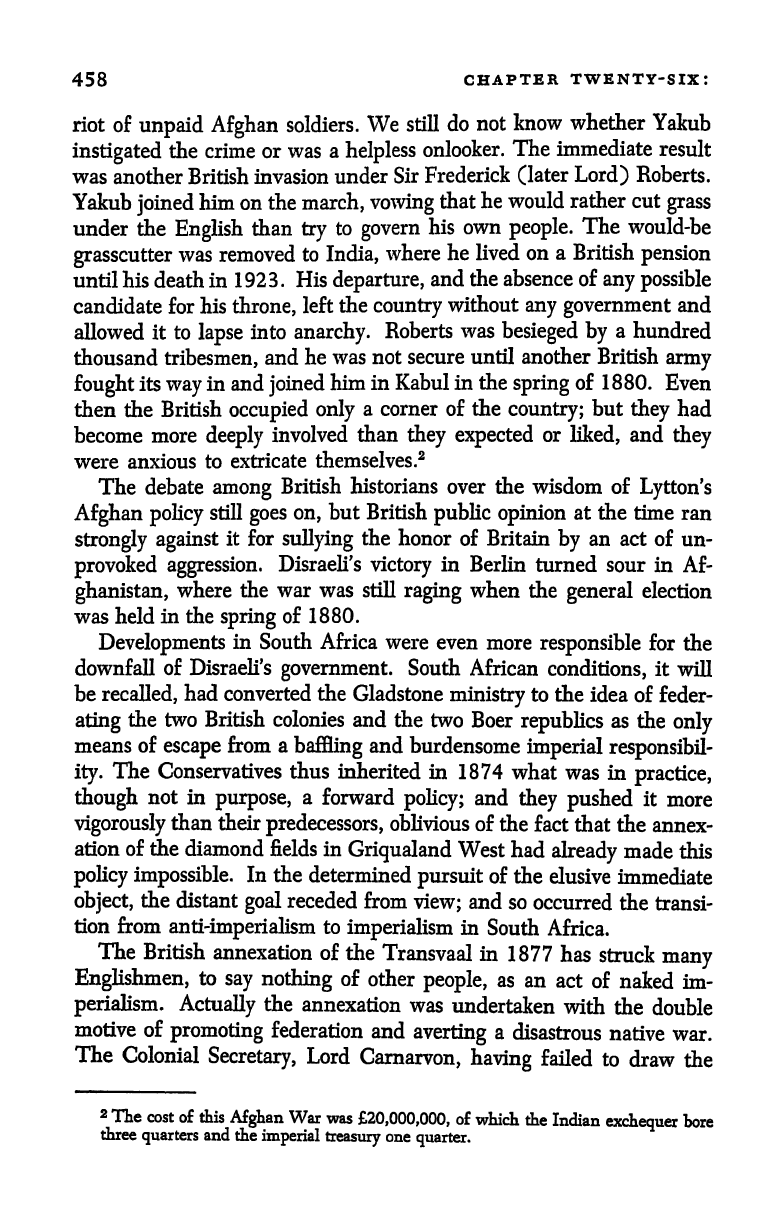
458
CHAPTER
TWENTY-SIX:
riot
of
unpaid
Afghan
soldiers.
We
still
do
not
know
whether
Yakub
instigated
the crime or was
a
helpless
onlooker.
The immediate
result
was another British invasion
under
Sir
Frederick
(later
Lord)
Roberts.
Yakub
joined
him on the
march,
vowing
that
he
would
rather cut
grass
under the
English
than
try
to
govern
his
own
people.
The
would-be
grasscutter
was removed
to
India,
where he
lived on
a British
pension
until his death in
1923.
His
departure,
and
the
absence
of
any
possible
candidate for
his
throne,
left
the
country
without
any
government
and
allowed it to
lapse
into
anarchy.
Roberts was
besieged
by
a
hundred
thousand
tribesmen,
and
he
was
not secure until another British
army
fought
its
way
in and
joined
him
in Kabul in the
spring
of
1880.
Even
then the British
occupied
only
a corner
of
the
country;
but
they
had
become more
deeply
involved
than
they
expected
or
liked,
and
they
were anxious
to
extricate
themselves.
2
The debate
among
British historians
over the wisdom of
Lytton's
Afghan
policy
still
goes
on,
but British
public opinion
at the time
ran
strongly against
it
for
sullying
the
honor
of Britain
by
an act
of
un-
provoked
aggression.
Disraeli's
victory
in
Berlin
turned
sour
in
Af-
ghanistan,
where
the
war
was
still
raging
when the
general
election
was held
in
the
spring
of
1880.
Developments
in
South Africa
were
even
more
responsible
for
the
downfall
of Disraeli's
government.
South
African
conditions,
it
will
be
recalled,
had converted the
Gladstone
ministry
to
the
idea of
feder-
ating
the two British colonies
and
the two Boer
republics
as
the
only
means
of
escape
from
a
baffling
and
burdensome
imperial
responsibil-
ity.
The
Conservatives thus
inherited in 1874
what
was in
practice,
though
not
in
purpose,
a
forward
policy;
and
they pushed
it
more
vigorously
than their
predecessors,
oblivious
of
the
fact that
the
annex-
ation of
die
diamond
fields
in
Griqualand
West
had
already
made this
policy impossible.
In the
determined
pursuit
of the
elusive
immediate
object,
the
distant
goal
receded
from
view;
and
so
occurred the
transi-
tion from
anti-imperialism
to
imperialism
in
South
Africa.
The British
annexation
of the
Transvaal in
1877
has
struck
many
Englishmen,
to
say
nothing
of
other
people,
as an
act
of
naked im-
perialism.
Actually
the
annexation
was
undertaken
with
the
double
motive of
promoting
federation
and
averting
a
disastrous
native
war.
The
Colonial
Secretary,
Lord
Carnarvon,
having
failed
to
draw
the
2
The cost
of
this
Afghan
War
was
20,000,000,
of
which
the
Indian
exchequer
bore
three
quarters
and
the
imperial
treasury
one
quarter.
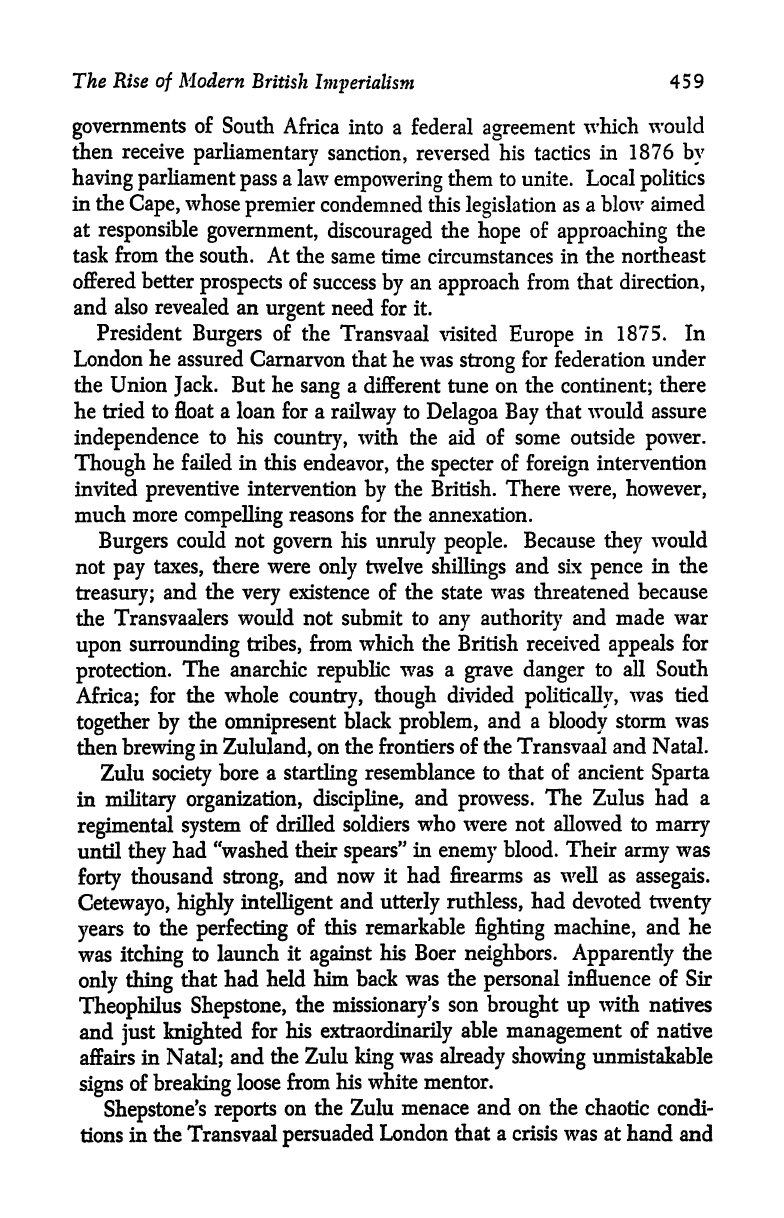
The
Rise
of
Modern
British
Imperialism
459
governments
of
South
Africa
into
a
federal
agreement
which
would
then
receive
parliamentary
sanction,
reversed his
tactics
in
1876
by
having
parliament
pass
a
law
empowering
them to
unite.
Local
politics
in
the
Cape,
whose
premier
condemned
this
legislation
as a
blow
aimed
at
responsible
government,
discouraged
the
hope
of
approaching
the
task from
the
south.
At
the
same
time circumstances
in the
northeast
offered
better
prospects
of
success
by
an
approach
from
that
direction,
and
also
revealed an
urgent
need for it.
President
Burgers
of
the
Transvaal visited
Europe
in
1875. In
London
he
assured
Carnarvon that he was
strong
for federation
under
the Union
Jack.
But he
sang
a
different tune on
the
continent;
there
he
tried to float
a
loan
for
a
railway
to
Delagoa
Bay
that would
assure
independence
to his
country,
with
the aid
of some outside
power.
Though
he failed in
this
endeavor,
the
specter
of
foreign
intervention
invited
preventive
intervention
by
the British. There
were,
however,
much
more
compelling
reasons
for
the annexation.
Burgers
could not
govern
his
unruly people.
Because
they
would
not
pay
taxes,
there were
only
twelve
shillings
and
six
pence
in the
treasury;
and
the
very
existence of the state
was
threatened
because
the
Transvaalers
would
not submit
to
any
authority
and
made war
upon
surrounding
tribes,
from
which
the
British received
appeals
for
protection.
The
anarchic
republic
was
a
grave danger
to all South
Africa;
for
the whole
country,
though
divided
politically,
was
tied
together
by
the
omnipresent
black
problem,
and
a
bloody
storm
was
then
brewing
in
Zululand,
on
the
frontiers
of the
Transvaal and Natal.
Zulu
society
bore
a
startling
resemblance
to that of
ancient
Sparta
in
military organization,
discipline,
and
prowess.
The Zulus
had
a
regimental
system
of
drilled soldiers who
were
not
allowed to
marry
until
they
had
"washed
their
spears"
in
enemy
blood. Their
army
was
forty
thousand
strong,
and
now
it had
firearms as well as
assegais.
Cetewayo, highly
intelligent
and
utterly
ruthless,
had devoted
twenty
years
to the
perfecting
of this
remarkable
fighting
machine,
and he
was
itching
to launch
it
against
his
Boer
neighbors.
Apparently
the
only
thing
that had
held
him back
was the
personal
influence
of Sir
Theophilus
Shepstone,
the
missionary's
son
brought up
with
natives
and
just
knighted
for
his
extraordinarily
able
management
of native
affairs
in
Natal;
and the
Zulu
king
was
already
showing
unmistakable
signs
of
breaking
loose
from
his white mentor.
Shepstone's
reports
on
the Zulu
menace and on the
chaotic
condi-
tions
in the
Transvaal
persuaded
London
that
a
crisis
was
at
hand
and
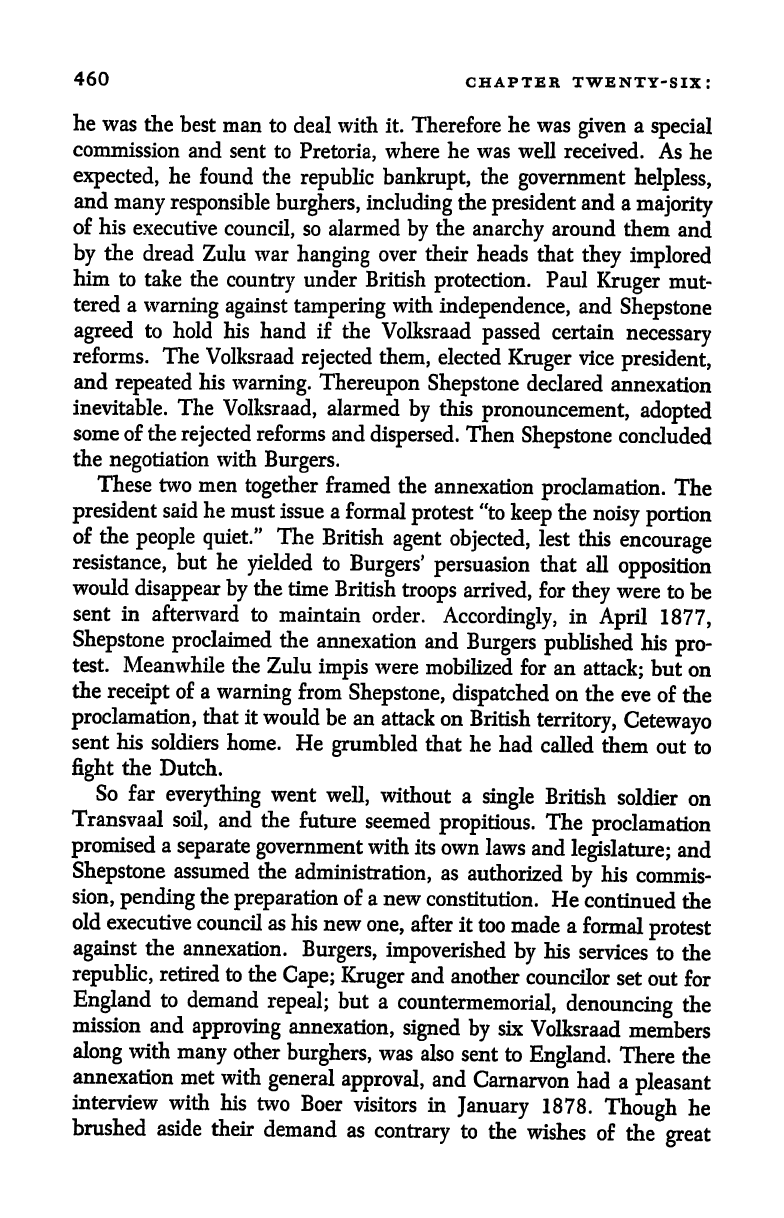
460
CHAPTER
TWENTY-SIX:
he
was
the
best
man
to
deal
with it. Therefore
he was
given
a
special
commission
and sent
to
Pretoria,
where
he was
well received.
As
he
expected,
he
found
the
republic bankrupt,
the
government
helpless,
and
many
responsible
burghers,
including
the
president
and a
majority
of
his
executive
council,
so alarmed
by
the
anarchy
around
them
and
by
the
dread
Zulu
war
hanging
over their
heads
that
they
implored
him
to
take the
country
under British
protection.
Paul
Kruger
mut-
tered a
warning against
tampering
with
independence,
and
Shepstone
agreed
to
hold his
hand if the
Volksraad
passed
certain
necessary
reforms. The
Volksraad
rejected
them,
elected
Kruger
vice
president,
and
repeated
his
warning. Thereupon
Shepstone
declared
annexation
inevitable.
The
Volksraad,
alarmed
by
this
pronouncement,
adopted
some
of the
rejected
reforms
and
dispersed.
Then
Shepstone
concluded
the
negotiation
with
Burgers.
These two men
together
framed the
annexation
proclamation.
The
president
said
he
must
issue a
formal
protest
"to
keep
the
noisy
portion
of the
people
quiet."
The
British
agent
objected,
lest
this
encourage
resistance,
but he
yielded
to
Burgers'
persuasion
that
all
opposition
would
disappear
by
the
time
British
troops
arrived,
for
they
were to
be
sent in
afterward
to
maintain
order.
Accordingly,
in
April
1877,
Shepstone
proclaimed
the
annexation
and
Burgers published
his
pro-
test.
Meanwhile
the
Zulu
impis
were
mobilized
for an
attack;
but
on
the
receipt
of a
warning
from
Shepstone,
dispatched
on
the
eve
of
the
proclamation,
that
it
would
be an
attack
on
British
territory,
Cetewayo
sent
his
soldiers
home.
He
grumbled
that
he
had
called
them
out
to
fight
the
Dutch.
So far
everything
went
well,
without a
single
British
soldier
on
Transvaal
soil,
and
the
future
seemed
propitious.
The
proclamation
promised
a
separate
government
with
its
own
laws
and
legislature;
and
Shepstone
assumed
the
administration,
as
authorized
by
his
commis-
sion,
pending
the
preparation
of
a new
constitution.
He
continued
the
old executive
council as
his new
one,
after
it
too
made a
formal
protest
against
the
annexation.
Burgers,
impoverished
by
his
services
to
the
republic,
retired
to the
Cape;
Kruger
and
another
councilor
set
out
for
England
to
demand
repeal;
but a
countermemorial,
denouncing
the
mission
and
approving
annexation,
signed
by
six
Volksraad
members
along
with
many
other
burghers,
was
also
sent to
England.
There
the
annexation met
with
general
approval,
and
Carnarvon
had a
pleasant
interview
with
his
two Boer
visitors
in
January
1878.
Though
he
brushed aside their
demand
as
contrary
to
the
wishes
of
the
great
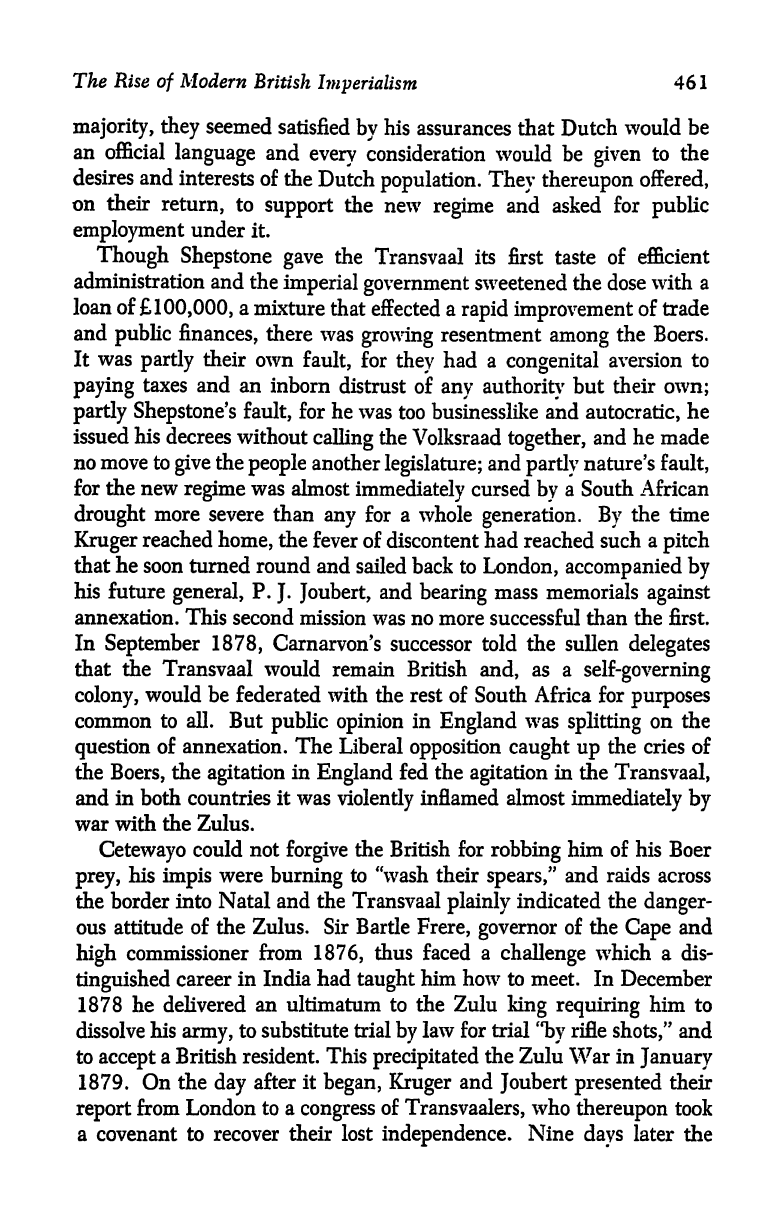
The
Rise
of
Modern
British
Imperialism
461
majority,
they
seemed
satisfied
by
his
assurances that
Dutch
would
be
an
official
language
and
every
consideration
would
be
given
to
the
desires and
interests
of
the
Dutch
population.
They
thereupon
offered,
on
their
return,
to
support
the new
regime
and
asked
for
public
employment
under
it.
Though Shepstone
gave
the
Transvaal its
first
taste of
efficient
administration
and the
imperial
government
sweetened
the
dose
with a
loan
of
100,000,
a
mixture
that
effected
a
rapid improvement
of
trade
and
public
finances,
there
was
growing
resentment
among
the Boers.
It
was
partly
their
own
fault,
for
they
had a
congenital
aversion
to
paying
taxes
and an
inborn
distrust
of
any
authority
but
their
own;
partly
Shepstone's
fault,
for
he
was
too
businesslike and
autocratic,
he
issued
his
decrees
without
calling
the
Volksraad
together,
and
he made
no move to
give
the
people
another
legislature;
and
partly
nature's
fault,
for
the new
regime
was
almost
immediately
cursed
by
a
South
African
drought
more severe
than
any
for
a
whole
generation.
By
the time
Kruger
reached
home,
the
fever of discontent had
reached
such
a
pitch
that
he
soon
turned
round
and
sailed back to
London,
accompanied by
his
future
general,
P.
J. Joubert,
and
bearing
mass memorials
against
annexation.
This
second
mission
was
no
more successful than
the first.
In
September
1878,
Carnarvon's successor told the sullen
delegates
that
tibe
Transvaal
would remain
British
and,
as
a
self-governing
colony,
would
be federated with the rest of South Africa
for
purposes
common to all. But
public
opinion
in
England
was
splitting
on
the
question
of
annexation.
The Liberal
opposition caught up
the
cries of
the
Boers,
the
agitation
in
England
fed the
agitation
in the
Transvaal,
and
in both countries
it
was
violently
inflamed almost
immediately
by
war with
the
Zulus.
Cetewayo
could not
forgive
the
British for
robbing
him of his
Boer
prey,
his
impis
were
burning
to "wash their
spears,"
and
raids across
the border
into Natal
and
the Transvaal
plainly
indicated the
danger-
ous attitude
of the Zulus. Sir Bartle
Frere,
governor
of the
Cape
and
high
commissioner
from
1876,
thus faced
a
challenge
which a dis-
tinguished
career
in
India
had
taught
him how to meet.
In December
1878 he delivered
an
ultimatum to
the Zulu
king
requiring
him
to
dissolve
his
army,
to substitute
trial
by
law for
trial
"by
rifle
shots,"
and
to
accept
a British resident.
This
precipitated
the
Zulu
War
in
January
1879.
On
the
day
after
it
began,
Kruger
and
Joubert
presented
their
report
from London to
a
congress
of
Transvaalers,
who
thereupon
took
a covenant to
recover
their lost
independence.
Nine
days
later
the
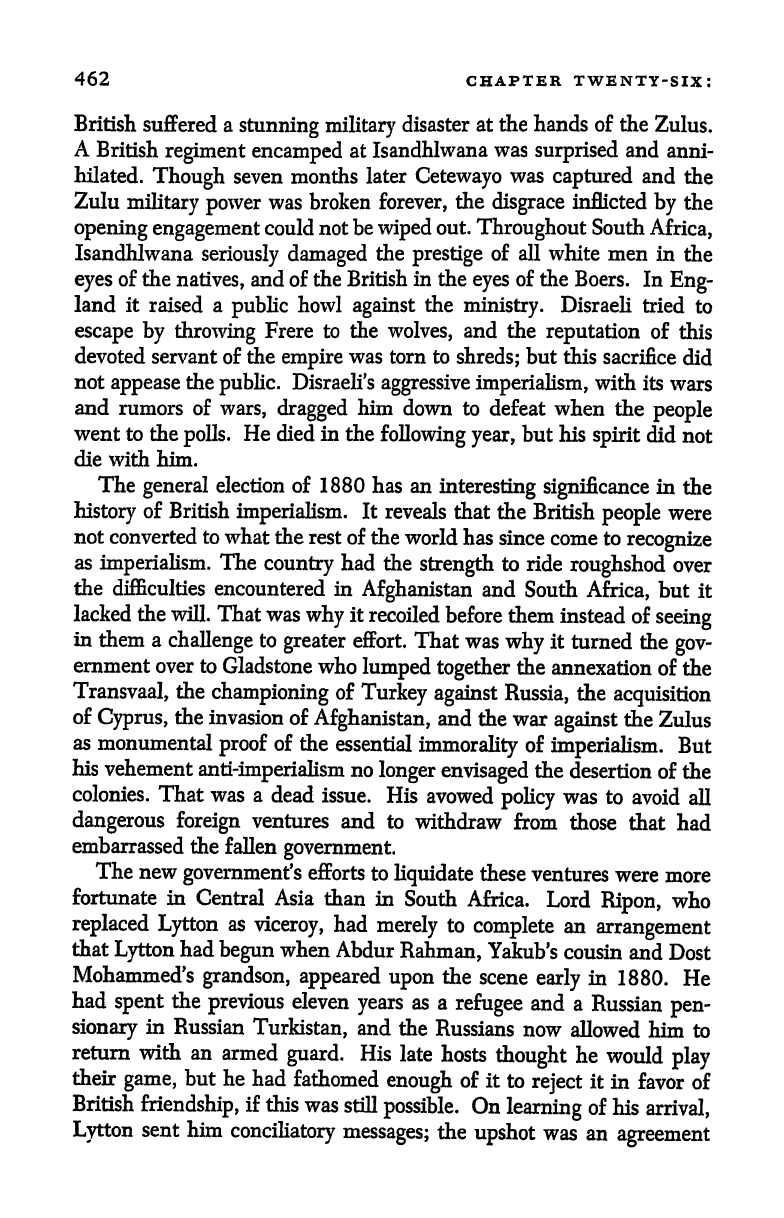
462
CHAPTER
TWENTY-SIX:
British
suffered
a
stunning
military
disaster
at
the hands of the
Zulus.
A
British
regiment encamped
at
Isandhlwana
was
surprised
and
anni-
hilated.
Though
seven months later
Cetewayo
was
captured
and
the
Zulu
military power
was
broken
forever,
the
disgrace
inflicted
by
the
opening
engagement
could
not be
wiped
out.
Throughout
South
Africa,
Isandhlwana
seriously damaged
the
prestige
of all white
men
in
the
eyes
of the
natives,
and of
the
British
in
the
eyes
of the
Boers. In
Eng-
land
it
raised
a
public
howl
against
the
ministry.
Disraeli
tried
to
escape
by
throwing
Frere to
the
wolves,
and the
reputation
of
this
devoted servant
of
the
empire
was torn to
shreds;
but this
sacrifice
did
not
appease
the
public.
Disraeli's
aggressive
imperialism,
with
its
wars
and
rumors of
wars,
dragged
him
down to defeat
when
the
people
went to
the
polls.
He
died
in the
following
year,
but his
spirit
did
not
die with him.
The
general
election of 1880
has an
interesting
significance
in
the
history
of
British
imperialism.
It
reveals that
the British
people
were
not
converted to
what
the
rest of
the
world
has
since come
to
recognize
as
imperialism.
The
country
had the
strength
to
ride
roughshod
over
the
difficulties encountered
in
Afghanistan
and
South
Africa,
but
it
lacked the
will. That was
why
it
recoiled
before
them
instead of
seeing
in
them
a
challenge
to
greater
effort.
That
was
why
it
turned the
gov-
ernment over
to Gladstone
who
lumped
together
the
annexation
of
the
Transvaal,
the
championing
of
Turkey
against
Russia,
the
acquisition
of
Cyprus,
the
invasion
of
Afghanistan,
and the war
against
the
Zulus
as
monumental
proof
of
the
essential
immorality
of
imperialism.
But
his vehement
anti-imperialism
no
longer
envisaged
the
desertion
of
the
colonies.
That
was a
dead
issue.
His
avowed
policy
was to
avoid
all
dangerous
foreign
ventures
and
to
withdraw
from
those
that
had
embarrassed the
fallen
government.
The new
government's
efforts
to
liquidate
these
ventures
were
more
fortunate
in
Central Asia
than in
South
Africa.
Lord
Ripon,
who
replaced
Lytton
as
viceroy,
had
merely
to
complete
an
arrangement
that
Lytton
had
begun
when
Abdur
Rahman,
Yakub's
cousin
and
Dost
Mohammed's
grandson,
appeared
upon
the
scene
early
in
1880.
He
had
spent
the
previous
eleven
years
as a
refugee
and a
Russian
pen-
sionary
in
Russian
Turkistan,
and
the
Russians now
allowed him
to
return with
an
armed
guard.
His
late
hosts
thought
he
would
play
their
game,
but
he
had
fathomed
enough
of
it
to
reject
it
in
favor of
British
friendship,
if
this
was
still
possible.
On
learning
of
his
arrival,
Lytton
sent
him
conciliatory
messages;
the
upshot
was
an
agreement
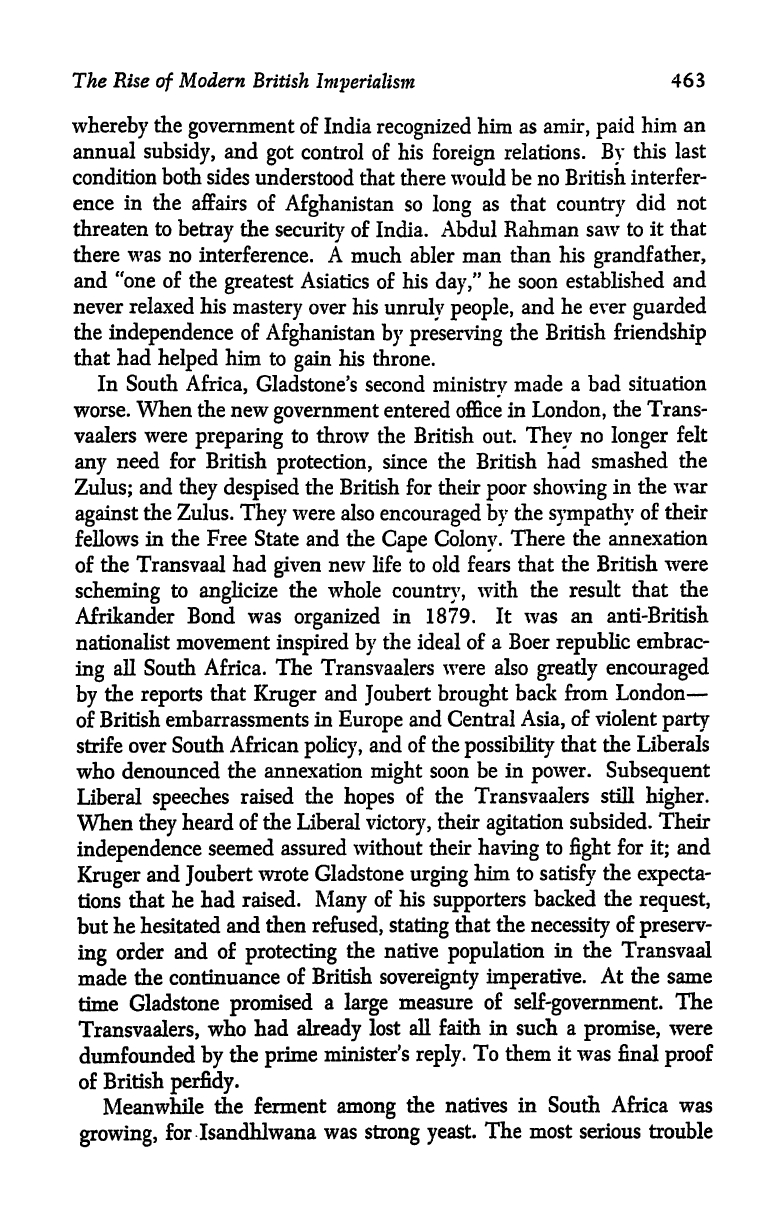
The
Rise
of
Modern
British
Imperialism
463
whereby
the
government
of India
recognized
him
as
amir,
paid
him
an
annual
subsidy,
and
got
control of
his
foreign
relations.
By
this
last
condition
both
sides
understood that there
would
be no
British
interfer-
ence in the
affairs
of
Afghanistan
so
long
as that
country
did
not
threaten
to
betray
the
security
of
India.
Abdul
Rahman
saw to
it that
there was
no
interference.
A
much abler
man than his
grandfather,
and "one of the
greatest
Asiatics
of
his
day,"
he
soon
established
and
never relaxed his
mastery
over
his
unruly
people,
and
he
ever
guarded
the
independence
of
Afghanistan
by preserving
the
British
friendship
that
had
helped
him
to
gain
his throne.
In
South
Africa,
Gladstone's second
ministry
made
a
bad
situation
worse.
When the new
government
entered office
in
London,
the
Trans-
vaalers
were
preparing
to throw
the
British out.
They
no
longer
felt
any
need
for British
protection,
since
the
British
had
smashed
the
Zulus;
and
they
despised
the
British for
their
poor
showing
in the
\var
against
the Zulus.
They
were also
encouraged
by
the
sympathy
of
their
fellows
in the
Free
State
and the
Cape
Colony.
There the
annexation
of
the
Transvaal
had
given
new
life to old
fears
that
the
British
were
scheming
to
anglicize
the
whole
country,
with the result
that
the
Afrikander
Bond
was
organized
in 1879. It
was
an
anti-British
nationalist
movement
inspired
by
the
ideal
of
a
Boer
republic
embrac-
ing
all
South
Africa. The Transvaalers
were also
greatly
encouraged
by
the
reports
that
Kruger
and
Joubert
brought
back from
London
of
British
embarrassments in
Europe
and Central
Asia,
of
violent
party
strife
over
South
African
policy,
and of the
possibility
that
the
Liberals
who
denounced
the
annexation
might
soon
be
in
power.
Subsequent
Liberal
speeches
raised the
hopes
of
the
Transvaalers still
higher.
When
they
heard
of
the Liberal
victory,
their
agitation
subsided.
Their
independence
seemed
assured
without
their
having
to
fight
for
it;
and
Kruger
and
Joubert
wrote
Gladstone
urging
him to
satisfy
the
expecta-
tions
that
he had raised.
Many
of his
supporters
backed
the
request,
but
he hesitated
and
then
refused,
stating
that
the
necessity
of
preserv-
ing
order
and
of
protecting
the
native
population
in
the
Transvaal
made
the continuance
of
British
sovereignty
imperative.
At
the
same
time Gladstone
promised
a
large
measure of
self-government.
The
Transvaalers,
who
had
already
lost
all faith in such
a
promise,
were
dumfounded
by
the
prime
minister's
reply.
To them
it
was
final
proof
of
British
perfidy.
Meanwhile
the
ferment
among
the
natives
in
South Africa was
growing,
for Isandhlwana
was
strong
yeast.
The most
serious
trouble
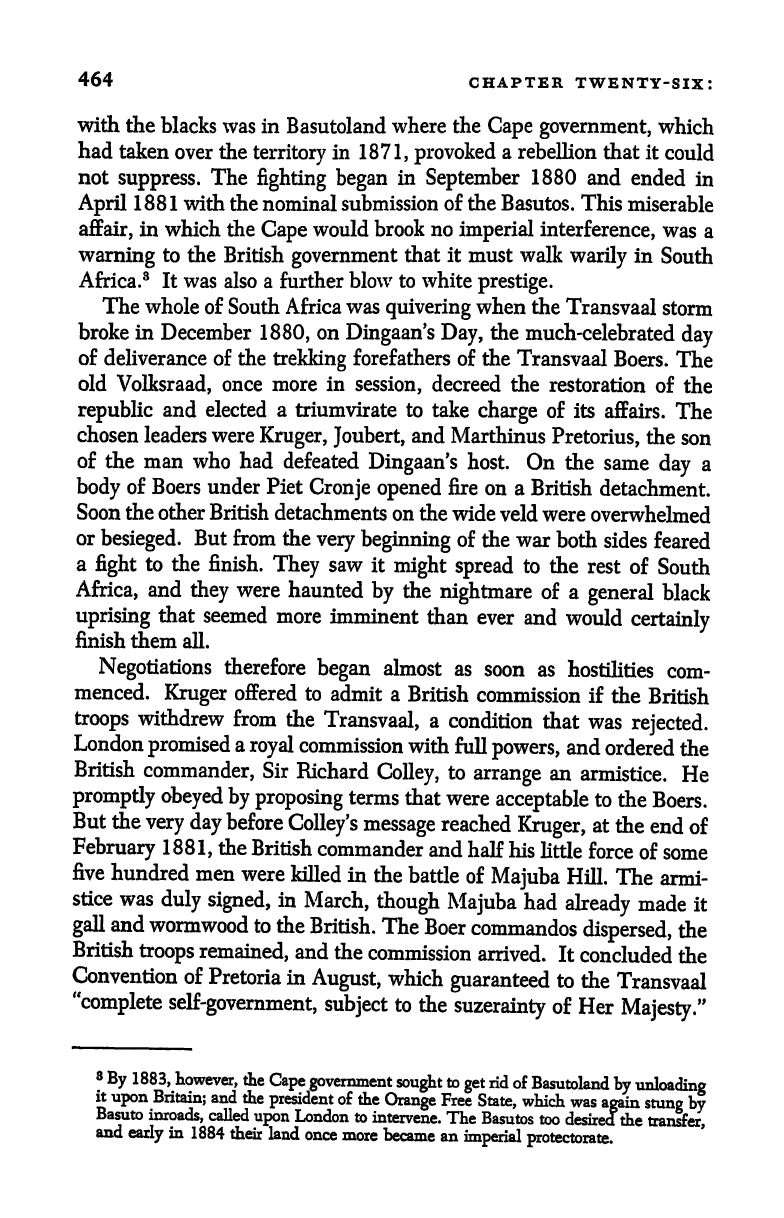
464
CHAPTER
TWENTY-SIX:
with
the
blacks was
in
Basutoland
where the
Cape government,
which
had
taken
over the
territory
in
1871,
provoked
a
rebellion that
it
could
not
suppress.
The
fighting
began
in
September
1880
and
ended
in
April
1881
with the
nominal
submission
of the
Basutos.
This
miserable
affair,
in which the
Cape
would
brook
no
imperial
interference,
was
a
warning
to
the
British
government
that it must
walk
warily
in
South
Africa.
3
It
was also a further
blow
to
white
prestige.
The
whole of South Africa
was
quivering
when
the
Transvaal
storm
broke
in
December
1880,
on
Dingaan's Day,
the
much-celebrated
day
of
deliverance of
the
trekking
forefathers
of
the
Transvaal
Boers.
The
old
Volksraad,
once more
in
session,
decreed
the
restoration of
the
republic
and
elected
a
triumvirate
to
take
charge
of
its
affairs.
The
chosen
leaders
were
Kruger,
Joubert,
and
Marthinus
Pretorius,
the
son
of the man
who had defeated
Dingaan's
host.
On the
same
day
a
body
of Boers under Piet
Cronje
opened
fire
on a
British
detachment.
Soon the other British
detachments
on the wide
veld
were
overwhelmed
or
besieged.
But
from
the
very
beginning
of
the
war
both
sides
feared
a
fight
to the
finish.
They
saw
it
might
spread
to
the
rest
of
South
Africa,
and
they
were
haunted
by
the
nightmare
of a
general
black
uprising
that
seemed
more
imminent
than
ever
and
would
certainly
finish them
all.
Negotiations
therefore
began
almost
as
soon as
hostilities
com-
menced.
Kruger
offered
to
admit
a
British
commission if
the
British
troops
withdrew
from
the
Transvaal,
a
condition
that
was
rejected.
London
promised
a
royal
commission
with
full
powers,
and
ordered
the
British
commander,
Sir
Richard
Colley,
to
arrange
an
armistice.
He
promptly
obeyed by
proposing
terms
that were
acceptable
to
the
Boers.
But
the
very
day
before
Colley's
message
reached
Kruger,
at
the
end of
February
1881,
the
British
commander
and
half
his
little
force
of
some
five
hundred
men
were
killed in
the
battle
of
Majuba
Hill.
The
armi-
stice
was
duly
signed,
in
March,
though
Majuba
had
already
made it
gall
and
wormwood
to
the
British.
The
Boer
commandos
dispersed,
the
British
troops
remained,
and
the
commission
arrived.
It
concluded
the
Convention
of
Pretoria in
August,
which
guaranteed
to
the
Transvaal
"complete
self-government,
subject
to
the
suzerainty
of
Her
Majesty."
8
By
1883,
however,
the
Cape
government
sought
to
get
rid
of
Basutoland
by
unloading
it
upon
Britain;
and
the
president
of
the
Orange
Free
State,
which
was
again stung by
Basuto
inroads,
called
upon
London
to
intervene.
The
Basutos
too
desired
the
transfer,
and
early
in
1884
their
land
once
more
became
an
imperial
protectorate.
